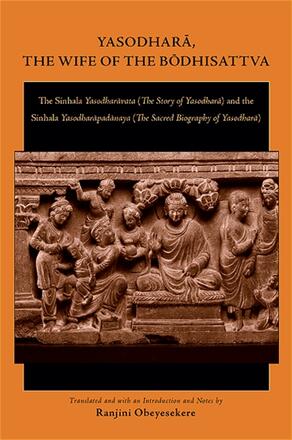
Yasodharā, the Wife of the Bōdhisattva
The Sinhala Yasodharāvata (The Story of Yasodharā) and the Sinhala Yasodharāpadānaya (The Sacred Biography of Yasodharā)
Alternative formats available from:
Translations of two works from Sri Lanka on Yasodharā, the wife of the Buddha—an allusive and intriguing figure in Buddhist lore and literature.
Description
What about Buddha's wife? We all know that Prince Siddhartha left his wife and infant son to begin his journey to enlightenment. The Pali canon does not mention the woman he left behind. Yasodharā enters the commentarial tradition around the first century CE and lives on in the folk tradition, growing from a shadowy figure to a nun and arahat (an Enlightened One), even gaining magical powers. In this book, Ranjini Obeyesekere offers a translation of two works from Sri Lanka on this intriguing figure. The Yasodharāvata (The Story of Yasodharā) is a folk poem, whose best-known verses are Yasodharā's lament over the departure of her husband. The Yasodharāpadānaya (The Sacred Biography of Yasodharā) is an account of Yasodharā as a nun capable of miracles, who has traveled through saṃsāra with the Bodhisattva, and who is praised by him. Obeyesekere places these works within their historical and literary context and provides a glossary of Buddhist terms.
Ranjini Obeyesekere is an independent scholar and retired Lecturer of Anthropology at Princeton University. She is the author, editor, and translator of several books, including Portraits of Buddhist Women: Stories from the Saddharmaratnavaliya and Jewels of the Doctrine: Stories of the Saddharma Ratnāvaliya, both also published by SUNY Press.
Reviews
"…a challenging and eye-opening read, and the retelling and sharing of Yasodharā's story is the most fundamental type of feminist act." — Feminist Review
"Obeyesekere gives us a masterful translation … [and] surveys the literary tradition that gave Yasodhara life and also discusses contemporary readings of the story." — Buddhadharma: The Practitioner's Quarterly
"The translations are fluid, appealing, and quite readable. This book illuminates the 'shadows' that obscured Yasodharā from the modernist, essentialized telling of the Buddha story, thereby enriching the growing genre of narratives of women in Buddhism." — Donald K. Swearer, author of The Buddhist World of Southeast Asia
"In her beautiful translation, Obeyesekere provides access to a world of Buddhism that has only been available to Sinhala readers. Many people will now be able to read, enjoy, and study these stories as an important aspect of what can be called 'devotional Buddhism.'" — George D. Bond, author of Buddhism at Work: Community Development, Social Empowerment and the Sarvodaya Movement